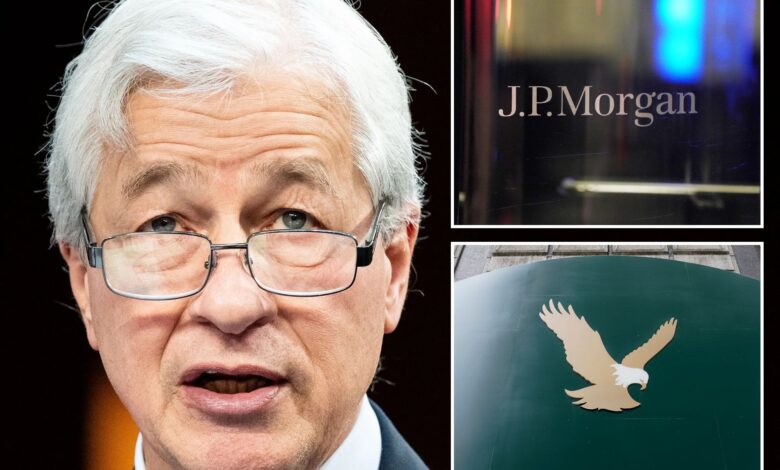JPMorgan earned one-fifth of total US bank profits through September

JPMorgan Chase generated nearly one-fifth of total bank profits in the US through the first nine months of the year as the Wall Street giant thrived despite the crisis that roiled much of the banking sector this year.
The banking subsidiary of JPMorgan reported $38.9 billion in profits through September — about 18% of the industry total, according to Financial Times.
To put the figure into perspective, the Jamie Dimon-run firm’s earnings for the nine-month period exceeded the combined haul of Citigroup and Bank of America, two of the nation’s other “big four” lenders along with JPMorgan and Wells Fargo.
“JPMorgan is the Goliath of Goliaths,” Wells Fargo analyst Mike Mayo told FT.
JPMorgan’s bottom line was aided after it gobbled up First Republic, which collapsed along with midsized lenders Silicon Valley Bank and Signature Bank.
Meanwhile, BofA, Wells Fargo and Citi have seen their share either remain flat or shrink.
When Dimon was tapped as JPMorgan CEO in 2005, the lender held around 8% of total US bank deposits — which was less than that held by BofA.
JPMorgan currently holds $2.5 trillion worth of deposits, which makes up more than 13% of the industry total — well ahead of BofA’s $1.9 trillion.
Wells Fargo had $1.5 trillion worth of deposits, according to data from the Federal Deposit Insurance Corporation (FDIC).
JPMorgan declined to comment.
Analysts credit Dimon with bolstering the bank’s balance sheet with its rescue of distressed First Republic, the California-based lender whose $92 billion in deposits and $203 billion in loans and other securities were acquired by JPMorgan Chase in a fire sale this past spring.
First Republic experienced a run from depositors after the collapses of Silicon Valley Bank and Signature Bank — lenders that had large amounts of uninsured deposits that weren’t covered by the FDIC.
The federal government asked JPMorgan to lead a coalition of banks that would infuse $30 billion to resuscitate ailing First Republic.
JPMorgan’s third-quarter profit soared 35% from last year, fueled by a rapid rise in interest rates.
The lender reported a profit of $13.15 billion, up from $9.74 billion in the same period a year earlier.
Total revenues in the July-September quarter were $39.87 billion, up from $32.7 billion a year ago.
That was largely driven by higher interest rates, which has allowed JPMorgan to charge customers significantly higher amounts of interest on loans compared to a year ago.
Dimon’s future has been the subject of intense speculation.
A recent report by Bloomberg News indicated that the bank’s chief financial officer, Jennifer Piepszak, has emerged as the leading candidate to succeed the 67-year-old executive.
Piepszak, who in the past has expressed reservations about inheriting the mantle from Dimon, is now willing to be considered if and when Dimon steps aside, according to Bloomberg News.
Her close friend and mentor, Marianne Lake, has also been pegged as a possible successor to Dimon, though she has fielded overtures from other companies about potentially taking on an executive position and leaving JPMorgan Chase.




